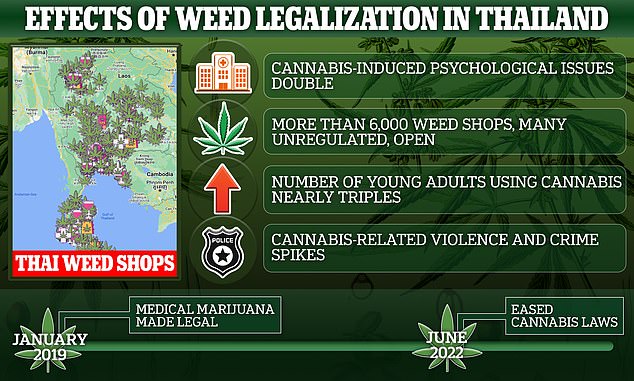Thailand is set to ban marijuana again just 18 months after the country decriminalized the drug.
The major U-turn comes following a rise in hospital admissions and cannabis-related crime, as well as a perception that children are getting hooked too easily.
Since June 2022, when marijuana ceased to be a controlled substance, hospitalizations for cannabis-induced psychological problems have doubled to 63,000 patients per year, while reports of drug-fueled violence and abuse have also increased .
Thailand became the first country in Asia to legalize marijuana in 2019, when the Bhumjaithai party promised it would be a boon for northern farmers.
Thailand has faced many repercussions after removing marijuana as a controlled substance, which is leading the country to tighten its laws.
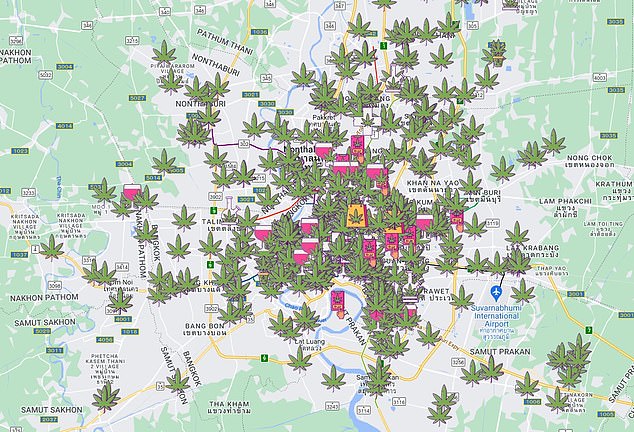
The above shows marijuana shops in Bangkok, Thailand.
But decriminalization has given rise to a large unregulated black market. Data shows that more than 6,000 stores have emerged in the country, many of them unlicensed.
There has also been a boom in tourists visiting the country to consume marijuana recreationally, which helps finance cannabis-themed cafes and hemp spas.
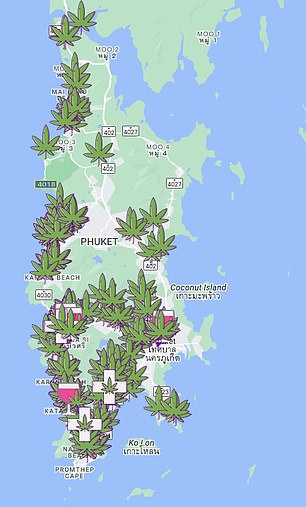
The above shows marijuana shops in Phuket, Thailand.
In response, the country’s Prime Minister Srettha Thavisin called marijuana a “big problem” and promised to take action after being elected in August 2023.
Top officials are now proposing a bill that would make cannabis use ‘for entertainment or pleasure’ is an offense punishable by a fine of $1,700 (60,000 baht) and a prison sentence of up to one year.
Last week, the country’s health minister, Chonlanan Srikaew, revealed that he had recommended a bill that would ban recreational cannabis.
“We drafted this law to prohibit the misuse of cannabis,” Health Minister Srikaew said earlier.
“All recreational use is wrong.”
It comes as the United States faces similar problems, with thousands of marijuana shops, many of them unregulated, springing up in many major cities amid reports of increases in psychological problems and addiction among young people.
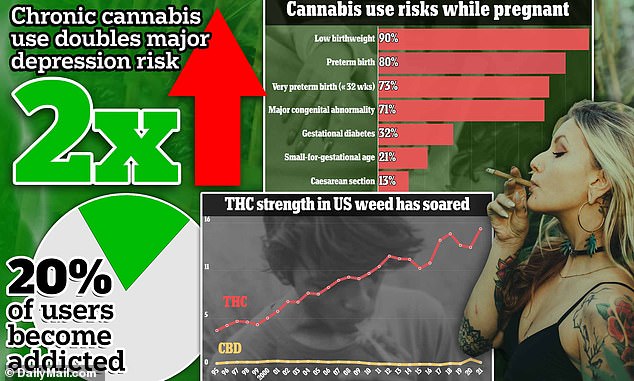
Marijuana is generally considered a low-risk drug, but consistent use can lead to a wide variety of health risks, including severe depression, lack of sleep, and dependence.
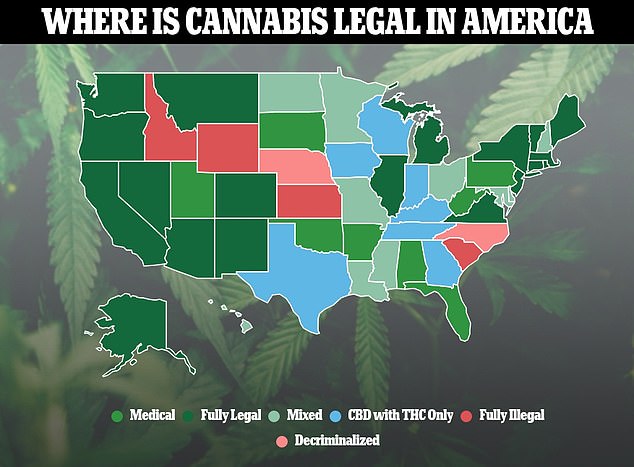
The above shows cannabis consumption in the states of the United States. Twenty-one states and DC have legalized it for recreational use in addition to medicinal use, while almost all now allow its use for medicinal purposes.
The new bill in Thailand would impose strict fines and possible jail terms for people who use the drug recreationally if it becomes law.
In Thailand, it is already illegal to smoke marijuana in public, which carries a fine of $700 (25,000 baht).
Data shows that among people ages 20 to 29, the share using marijuana tripled, from one percent to three percent by 2021, before regulations were relaxed. This figure is now likely to be much higher, officials say.
Data from the country’s Ministry of Health shows that the number of Thais seeking treatment for medical problems rose from 37,000 in 2022 to 63,000 in 2023, an increase of more than 70 percent.
There are also anecdotal reports of rising crime rates and spikes in drug-related violence.
The Thai bill will need to be approved by the Cabinet, voted on by Parliament and signed by the country’s king, Maha Vajiralongkorn, before it becomes law. But it already enjoys broad support in all political parties in the country.
A total of 24 US states have legalized marijuana for recreational use, with Ohio being the latest in November of last year.
No state has reversed legalization yet, but there has been a shift in public mood: Americans in many states are now voting against measures to legalize recreational cannabis.
This included Oklahoma, which rejected the proposal in March of last year despite cannabis companies spending more than $4.9 million on advertising.
The United States federal government is currently considering reducing marijuana to the category of a Schedule III substance, on par with steroids, ketamine, and testosterone. It is currently regulated as a Schedule I substance, on par with heroin, ecstasy and LSD, which are drugs considered to have a high likelihood of abuse and have no medical uses.
Thailand removed cannabis from its list of controlled substances in June 2022, labeling it instead as a “controlled herb.”
This allowed locals to grow and market marijuana and hemp products as long as they had a license.
The move was aimed at providing poor northern farmers with a new cash crop as they traditionally rely on rubber and rice, which have little value.
But it has been poorly regulated, leading to an explosion of marijuana stores across the country.
Cities such as Chiang Mai and the capital Bangkok now even hold marijuana festivals, while tourists from nearby countries where the drug is illegal, such as Japan and Singapore, have begun visiting in droves.
The drug was legal to sell only to people over 20 years old and not pregnant or trying to buy it online, and who were using it for medical purposes, for which marijuana was legalized in 2019.
“Kitty” Chopaka, a Thai cannabis rights activist, said NPR: ‘You can go ask any Thai on the side of the road and say: What do you think about medicinal cannabis? Everyone will go, this is great, support it fully.
‘But then if we dig deeper, what about sales, what about recreational use? There’s still… we’re not so sure.
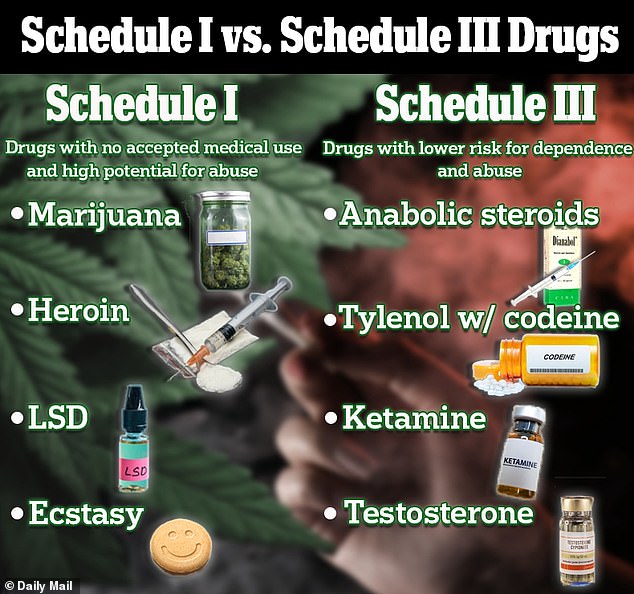
The Biden administration’s Department of Health and Human Services (HHS) has asked the Drug Enforcement Administration (DEA) to downgrade cannabis from a Schedule I substance to a Schedule III substance.
Previously, marijuana was praised for its benefits in relieving pain and treating anxiety, with many insisting that it was not addictive.
But the drug is now stronger than ever, with higher levels of THC (the drug’s psychoactive substance) that experts say floods the brain with feel-good chemicals and triggers addiction.
Many have also begun taking the drug daily, triggering an addiction and dependency that is not easy to overcome.
Previous studies have linked marijuana to schizophrenia, psychosis and depression.
Some have also suggested that it permanently changes the brains of young adults who use the drug, and that the brain does not mature until someone reaches their 20s.


